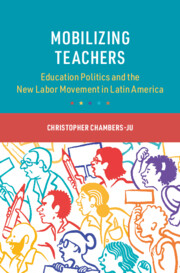Book contents
- Mobilizing Teachers
- Cambridge Studies in the Comparative Politics of Education
- Mobilizing Teachers
- Copyright page
- Dedication
- Contents
- Figures
- Tables
- Preface and Acknowledgments
- Abbreviations
- 1 Why Teachers?
- 2 How Union Organizations Shape Teacher Mobilization
- 3 The Origins of National Teacher Organizations
- 4 Organizational Consolidation in Mexico
- 5 Instrumentalism in Mexico
- 6 Organizational Weakening in Argentina
- 7 Movementism in Argentina
- 8 Factionalism in Colombia
- 9 Leftism in Colombia
- 10 Teacher Politics in Comparative Perspective
- References
- Index
9 - Leftism in Colombia
Published online by Cambridge University Press: 16 May 2024
- Mobilizing Teachers
- Cambridge Studies in the Comparative Politics of Education
- Mobilizing Teachers
- Copyright page
- Dedication
- Contents
- Figures
- Tables
- Preface and Acknowledgments
- Abbreviations
- 1 Why Teachers?
- 2 How Union Organizations Shape Teacher Mobilization
- 3 The Origins of National Teacher Organizations
- 4 Organizational Consolidation in Mexico
- 5 Instrumentalism in Mexico
- 6 Organizational Weakening in Argentina
- 7 Movementism in Argentina
- 8 Factionalism in Colombia
- 9 Leftism in Colombia
- 10 Teacher Politics in Comparative Perspective
- References
- Index
Summary
This chapter shows how factional divisions in FECODE shaped electoral mobilization and ideological rigidity. It links the repertoire of leftism to competition among rival factions in internal union elections. Contrary to the Argentine tendency toward ongoing and disruptive protests, protests by FECODE were easier for the government to manage owing to the political priorities of union factions. The next section shows how factionalism and ideological rigidity produced rival negotiating strategies that limited the influence of union leaders on the policy process. The final section shows that leftism remained the central tendency of political mobilization for the union throughout the 2010s.
Information
- Type
- Chapter
- Information
- Mobilizing TeachersEducation Politics and the New Labor Movement in Latin America, pp. 171 - 191Publisher: Cambridge University PressPrint publication year: 2024
